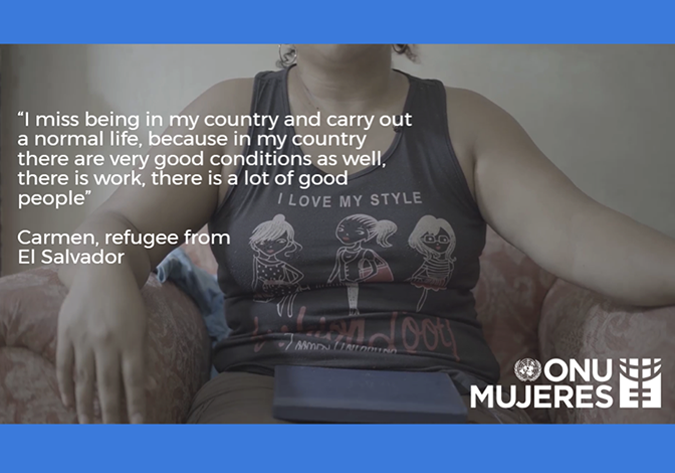“The Police itself suggested us to abandon the country”
Carmen’s history reflects the many violences that refugee women face then they are forced to leave their countryDate:

Carmen left El Salvador on April, 2014, looking for refuge after the Mara Salvatrucha gangs made of her life a nightmare. Her case illustrates the many violences that refugee women and girls face, which is the priority topic of June’s Orange Day.
“My family and me left the country because they kill my husband, we were working on our bakery business on a Sunday, it was noon, when the gang members of the Mara Salvatrucha came in. It was five armed gang members.
“They came in and told my husband that they were there to collect the rent”, she remembers, “and they started shooting, with no mercy, to my husband”.
Carmen saw her husband receiving five shots in front of her, standing up in front of her to cover her from the attack. Minutes later, she would see him die bleeding out.
“The convicted three of the attackers to 35 years of prison, but in the moment they caught them, my biggest suffering began, because I started to receive several threats from the gang and their families”, narrates the Salvadorian woman, now living in Panama City.
“The Police itself suggested us to abandon the country”.
And so she did. Carmen and her two sons are currently living in Panama, where she is applying for their refugee status, and for which she has received support from NGOs and from the UNHCR.
There are over 19.6 million refugees in the world, half of them are women, and they face different conditions, vulnerabilities and specific violences that rarely appear in the first range of humanitarian actions. According to reports from United Nations, 60 per cent of maternal deaths in the humanitarian contexts could be prevented, and at least 1 out 5 refugee or displaced women were victims of sexual violence.
Only in 2016, UNHCR registered 65.5 million forced displacement worldwide; displacement that, like in the case of Carmen, were forced by conflict, violence or human rights violations.
While she obtains her refugee status for her and her sons, Carmen has not been able to continue with her bakery nor to obtain a visa that enables her to work, so she depends on the’ assistance she is receiving from different organizations, as well as from her domestic informal work she carries out. Almost 1 out 6 domestic workers in the world are international migrants; women represent 73.4 per cent of the total amount of international migrants that are domestic workers. In spite of the lack of a regulated work, Carmen considers that this is not the most difficult thing she is facing.
“The toughest and most difficult thing was in the moment we came here, after a year of the conviction and from being in Panama, the attorney from El Salvador and the detective in the case called me to go back to make the public visitation, otherwise they were going to be freed; and since I was here as a refugee I didn’t get the permit to go out of the country. That means that they were set free, and they hate us even more now”.
“I miss my family, my uncles are still there, my grandmother, they all are still in El Salvador; I miss the normal life I had with my sons”, Carmen confess, “I miss being in my country and carry out a normal life, because in my country there are very good conditions as well, there is work, there is a lot of good people”.
If you want to know more stories and statistics about refugee women and girls, click here.
Author: Miguel Trancozo, with collaboration of Angela Flores and Pilar Castillo, UNHCR